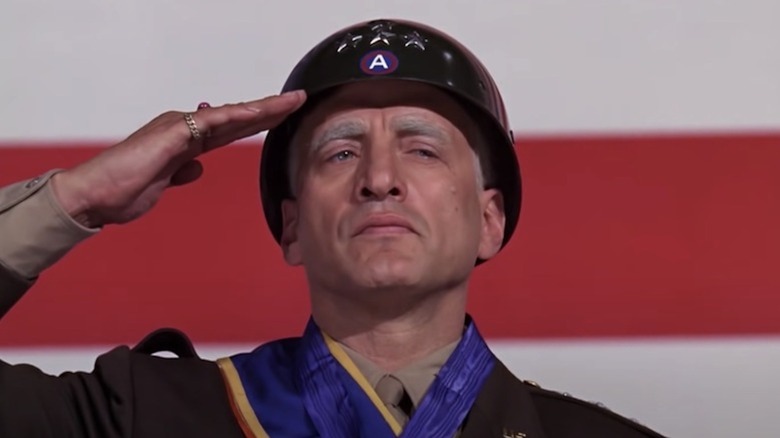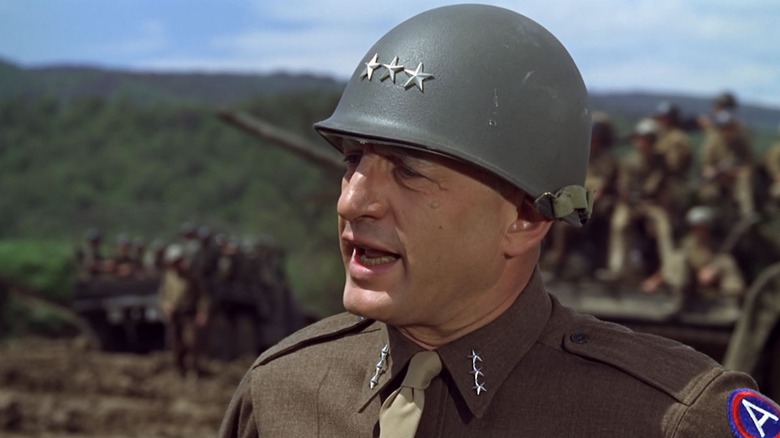The '70s World War II Movie With A Perfect Score From Roger Ebert
Franklin J. Schaffner's "Patton" is a 1970s Hollywood outlier. Released at the outset of the decade, when opposition to the Vietnam War was growing by the day, the film, in its depiction of titanic World War II General George S. Patton, crackled with a combat-crazed fervor that was so over the top, many critics and moviegoers felt it must've been some kind of stealth, anti-war satire. In her negative review for The New Yorker (via LA Times), Pauline Kael wrote, "This movie is both a satirical epic and a square celebration, yet the satire backfires. The film's style itself validates Patton the war lover as a hero."
"Patton" comes on hilariously strong with its classic opening scene, where the blustery general addresses the troops in front of a massive United States flag, but there is nothing overstated here. "We're going to murder those lousy Hun bastards by the bushel," declares Patton. This is tame compared to his pledge that "we will cut out their living guts and use them to grease the treads of our tanks." Patton lived for war, and he reveled in the brutality it brought out in himself and the men under his command.
In Roger Ebert's four-star review of "Patton," he knocks down the notion that there is anything satiric or anti-war about Schaffner's film. "It was a hard-line glorification of the military ethic," he wrote, "personified by a man whose flaws and eccentricities marginalized him in peacetime, but found the ideal theater in battle." This is correct, and the screenplay by Francis Ford Coppola (which earned him an Academy Award for Best Adapted Screenplay), hammers this home with zero subtlety. You don't go to a biopic about a man like Patton looking for nuance. And yet, Ebert made the point that the film's central performance is anything but one-note.
Roger Ebert vigorously saluted George C. Scott's portrayal of Patton
"Patton" was nominated for 10 Academy Awards and won seven, including Best Picture, Best Director, and Best Actor, and while each of those other recipients was deserving of recognition, it's safe to say none would've even been in the running were it not for George C. Scott's magnificent performance. Though Ebert hailed "Patton" as "one of the most uncluttered of war movies," he thought Scott succeeded in portraying "a many-layered man who desires to appear one-level."
Scott truly is the draw for this film. He's rarely off-screen, and he dominates just about every scene when he's in front of the camera. He's invigorated by his desert routing of German tactician Erwin Rommel, and he's infuriated by what he views as weakness from his charges (which led him to slap a PTSD-suffering soldier and, as a result, lose his career). Patton may be lost when he's not in the heat of combat, but until he's finally pulled out of the action, he could at least fill his downtime by reading and improving his strategist mind. Still, the most memorable moments in "Patton" find Scott puffing out his chest and glorying in the swagger that the general brought to the battlefield.
Interestingly, Ebert's review makes no mention of an element that makes "Patton" so strangely rewatchable: Jerry Goldsmith's jaunty orchestral score. The echoing, trumpet-blasted triplets and the main theme (an inspiring march) are as good as film scoring gets. Other than that, Ebert perfectly captures the brilliance of "Patton" — but I urge you to watch the movie first (which /Film called one of the 20 Best War Movies) before reading his review.

